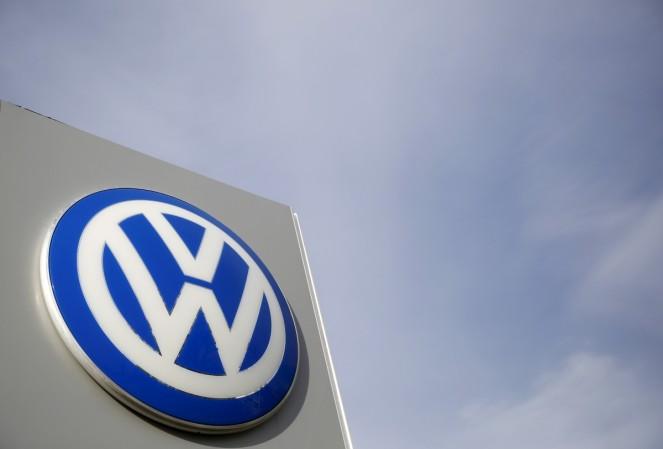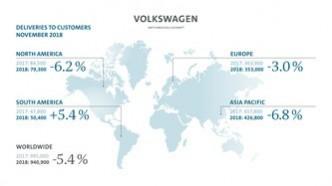
From January to November, the Volkswagen Group boosted worldwide deliveries by 1.8 percent to 9.92 million vehicles. Despite a tense market environment with stagnating overall markets, a deliveries record for 2018 as a whole is therefore within reach.
In November, the Volkswagen Group delivered a total of 940,900 vehicles throughout the world, corresponding to a fall of 5.4 percent compared with the prior-year month. Thanks to further progress with the WLTP changeover of the model range, deliveries in Europe were affected less severely in November.
At 3.0 percent, the fall compared with the prior-year month was considerably lower than in the two preceding months.
Dr. Christian Dahlheim, Head of Group Sales, said "The rise in worldwide deliveries in the course of the year is a very respectable result. Although the volume target is no longer our top priority, high volumes allow us to achieve economies of scale. In November, there was a reduction in the effect of WLTP in Europe. We are confident that we will be able to close 2018 with a figure slightly above the previous record level of 2017 despite the challenging market environment."
Deliveries in the regions developed as follows:

The Volkswagen Group made further progress with the changeover of their model range to the new WLTP test cycle. In Europe, where the fall in deliveries compared with the prior-year month was lower in November at 3.0 percent, than in the two preceding months, 353,000 vehicles were handed over to customers.
Both in Western Europe and in the home market of Germany, WLTP effects were less pronounced in November. In Western Europe, 283,100 vehicles were handed over to customers, 3.9 percent fewer than in November 2017.
In Germany, 106,800 vehicles were delivered to customers (-4.9 percent). There were positive developments in the region of Central and Eastern Europe in November. Deliveries reached 70,000 vehicles, a rise of 0.9 percent compared with the previous year.
This development was especially driven by the Russian market, with 22,900 deliveries (+22.8 percent). In Europe, the Volkswagen Group delivered 4.1 million vehicles from January to November, 1.8 percent more than in the comparable prior-year period.
In North America, the Volkswagen Group delivered 79,300 vehicles to customers in November, representing a fall of 6.2 percent compared with the previous year. While the markets of the USA (-8.1 percent) and Mexico (-5.4 percent) recorded falls compared with the previous year, a rise of 3.1 percent was achieved in Canada.
The region of South America developed positively in November compared with the previous year. 50,400 vehicles were handed over to customers, a rise of 5.4 percent. In the month under review, Brazil remained the main driver of growth in the region with 38,200 vehicles delivered (+22.3 percent). It was possible to compensate for the significant fall of 47.9 percent to 5,800 vehicles in Argentina as a result of the difficult economic environment.
In the Asia-Pacific region, deliveries in November declined by 6.8 percent to 426,800 vehicles. As in previous months, the tariff dispute with the USA had a marked impact on the overall market. The resulting reluctance of Chinese consumers to purchase vehicles led to a fall in deliveries in November to 399,500 vehicles, 7.3 percent fewer than in the prior-year month. During the year to date, the Group has delivered 3.8 million vehicles to customers in China, which represents growth of 2.2 percent over the comparable prior-year period.
| Deliveries to customers by markets | Nov. 2018 |
Nov. 2017 |
Change (%) | Jan.-Nov. 2018 | Jan.-Nov. 2017 | Change (%) |
| Europe | 353,000 | 363,900 | -3.0 | 4,060,800 | 3,989,700 | +1.8 |
| Western Europe | 283,100 | 294,500 | -3.9 | 3,331,400 | 3,311,900 | +0.6 |
| Germany | 106,800 | 112,200 | -4.9 | 1,193,500 | 1,189,000 | +0.4 |
| Central and Eastern Europe |
70,000 | 69,300 | +0.9 | 729,500 | 677,800 | +7.6 |
| Russia | 22,900 | 18,700 | +22.8 | 205,300 | 170,700 | +20.3 |
| North America | 79,300 | 84,500 | -6.2 | 872,300 | 884,900 | -1.4 |
| USA | 49,900 | 54,400 | -8.1 | 578,800 | 563,600 | +2.7 |
| South America | 50,400 | 47,800 | +5.4 | 541,300 | 483,100 | +12.1 |
| Brazil | 38,200 | 31,200 | +22.3 | 364,600 | 283,300 | +28.7 |
| Asia-Pacific | 426,800 | 457,800 | -6.8 | 4,115,000 | 4,016,600 | +2.5 |
| China (incl. HK) | 399,500 | 431,000 | -7.3 | 3,804,400 | 3,724,200 | +2.2 |
| Worldwide | 940,900 | 995,000 | -5.4 | 9,917,800 | 9,741,700 | +1.8 |
| Deliveries to customersby brands | Nov. 2018 |
Nov. 2017 |
Change (%) | Jan.-Nov. 2018 | Jan-Nov. 2017 | Change (%) |
| Volkswagen Passenger Cars | 564,500 | 594,300 | -5.0 | 5,704,300 | 5,636,100 | +1.2 |
| Audi | 132,700 | 159,200 | -16.7 | 1,657,900 | 1,697,900 | -2.4 |
| ŠKODA | 110,100 | 114,600 | -3.9 | 1,148,600 | 1,093,000 | +5.1 |
| SEAT | 43,300 | 40,400 | +7.2 | 492,300 | 435,500 | +13.1 |
| Porsche | 20,100 | 20,700 | -2.7 | 234,600 | 226,800 | +3.4 |
| Volkswagen Commercial Vehicles |
46,100 | 44,300 | +4.1 | 455,800 | 455,200 | +0.1 |
| MAN | 13,400 | 11,200 | +19.4 | 124,000 | 102,300 | +21.3 |
| Scania | 9,100 | 9,100 | +0.4 | 86,500 | 81,500 | +6.1 |
| Volkswagen Group (total) |
940,900 | 995,000 | -5.4 | 9,917,800 | 9,741,700 | +1.8 |
About the Volkswagen Group:
The Volkswagen Group, with its headquarters in Wolfsburg, is one of the world's leading automobile manufacturers and the largest carmaker in Europe.
The Group comprises twelve brands from seven European countries: Volkswagen Passenger Cars, Audi, SEAT, ŠKODA, Bentley, Bugatti, Lamborghini, Porsche, Ducati, Volkswagen Commercial Vehicles, Scania and MAN.
The passenger car portfolio ranges from small cars all the way to luxury-class vehicles. Ducati offers motorcycles. In the light and heavy commercial vehicles sector, the products include ranges from pick-ups, buses and heavy trucks.
Every weekday, 642,292 employees around the globe produce on average 44,170 vehicles, are involved in vehicle-related services or work in other areas of business. The Volkswagen Group sells its vehicles in 153 countries.
In 2017, the total number of vehicles supplied to customers by the Group globally was 10,741 million (2016: 10,297 million). The passenger car global market share was 12.1 percent. In Western Europe 22.0 percent of all new passenger cars come from the Volkswagen Group. Group sales revenue in 2017 totalled €231 billion (2016: €217 billion). Earnings after tax in 2017 amounted to €11.6 billion (2016: €5.4 billion).









